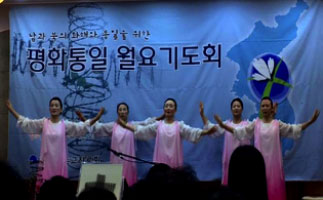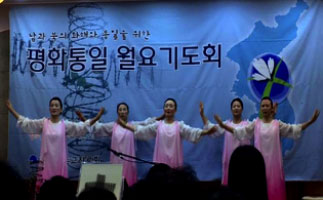Commentary: Pursue healing, justice, reconciliation, peace and reunification in Korea
This summer the national gathering of the United Church of Christ passed the resolution “A Call for Peace and Justice and Reunification in the Korean Peninsula.” As a peace and justice church, we are carrying on God’s mission of healing among all humankind. This situation in need of healing is unfamiliar to many in North America however.
 The year 2015 is the 70th anniversary of the liberation of East Asian countries from Japanese Imperialism following the end of World War II. This celebration was short-lived because the Korean Peninsula was divided immediately into two by the United States and USSR. The division brought the outbreak of the Korean War in 1950, a conflict which resulted in the death of over 350,000 U.S. and South Korean soldiers, 600,000 North Korean soldiers, and 1 million Chinese soldiers. Including those who died of disease, 2.5 million soldiers were sacrificed during the Korean War. If we add 3.5 million civilians, altogether 6 million people died. Additionally, the war engendered 3 million refugees and 10 million separated families. We have learned horrific lessons from the war. The legacy of the Korean War persists to this day. Despite the end of the Cold War, and after 60 years of ceasefire, a final Peace Agreement has never been reached to bring closure to the Korean War. The division of the Korean Peninsula still remains, thousands of families remain separated, and the hostilities and enmity between South and North continue to be internalized by the Korean people.
The year 2015 is the 70th anniversary of the liberation of East Asian countries from Japanese Imperialism following the end of World War II. This celebration was short-lived because the Korean Peninsula was divided immediately into two by the United States and USSR. The division brought the outbreak of the Korean War in 1950, a conflict which resulted in the death of over 350,000 U.S. and South Korean soldiers, 600,000 North Korean soldiers, and 1 million Chinese soldiers. Including those who died of disease, 2.5 million soldiers were sacrificed during the Korean War. If we add 3.5 million civilians, altogether 6 million people died. Additionally, the war engendered 3 million refugees and 10 million separated families. We have learned horrific lessons from the war. The legacy of the Korean War persists to this day. Despite the end of the Cold War, and after 60 years of ceasefire, a final Peace Agreement has never been reached to bring closure to the Korean War. The division of the Korean Peninsula still remains, thousands of families remain separated, and the hostilities and enmity between South and North continue to be internalized by the Korean people.
Since the passing of the resolution, the United Church of Christ has worked closely with a partner church, the Presbyterian Church in the Republic of Korea (PROK), on healing this lingering hostility and division. Korean churches and citizens have long desired and worked for the peaceful reunification of Korea. For the PROK, justice, peace and reunification are high priorities. For over 80 weeks in a row, members have observed a Monday Night Prayer Vigil for Peaceful Reunification. This simple public witness was inspired by the candlelight vigil in Leipzig which preceded the fall of the Berlin Wall on Nov. 9, 1989. Every time the pilgrims of peace gather for evening prayers, concerns for reunification, peace and people’s security in Northeast Asia and the world are mentioned and prayed for in hopes that a divided Korea can be united just as Germany was.
 In a message on the occasion of the 100th General Assembly of the Presbyterian Churches in Korea, the gathered international faith community declared that “radical transformations are needed so that we as churches and people of faith may resist empire and institutions of power. We understood that in carrying out and supporting initiatives for peaceful reunification of the North and South, we should journey with the Korean people, expressing empathy and solidarity in ways both familiar and new. We engage this urgent moment with steadfastness and faithful endurance, realizing that reunification is not a prize but a process of healing, nurturing and wholeness.”
In a message on the occasion of the 100th General Assembly of the Presbyterian Churches in Korea, the gathered international faith community declared that “radical transformations are needed so that we as churches and people of faith may resist empire and institutions of power. We understood that in carrying out and supporting initiatives for peaceful reunification of the North and South, we should journey with the Korean people, expressing empathy and solidarity in ways both familiar and new. We engage this urgent moment with steadfastness and faithful endurance, realizing that reunification is not a prize but a process of healing, nurturing and wholeness.”
Global Ministries of the United Church of Christ and the Christian Church (Disciples of Christ) has committed to walk with our Korean partners on this journey of peace and reunification. Let all join together on this mission to bring healing to the legacy of division and conflict that remains on the Korean peninsula.
(Photos: First- Monday Night Prayer Vigil for Peaceful Reunification, dance of peace by women from a Church in Guro-gu; Second-Life and Peace Camp for teenagers).
Xiaoling Zhu is Area Executive for East Asia and the Pacific.
View this and other columns on the UCC’s Witness for Justice page.
Donate to support Witness for Justice through the Neighbors in Need offering.
Click here to download the bulletin insert.
Related News
Demystifying the Stigma of Mental Illness
Like many others, I come from a family system that placed taboos on speaking publicly about...
Read MoreStaying Grounded in Tumultuous Times
For years I have referred to myself as a peace-loving hippie-type pacifist who believes that...
Read MoreVision and Reality
In 1215, at Runnymede in England, King John signed the Magna Carta. The mythos surrounding...
Read More
